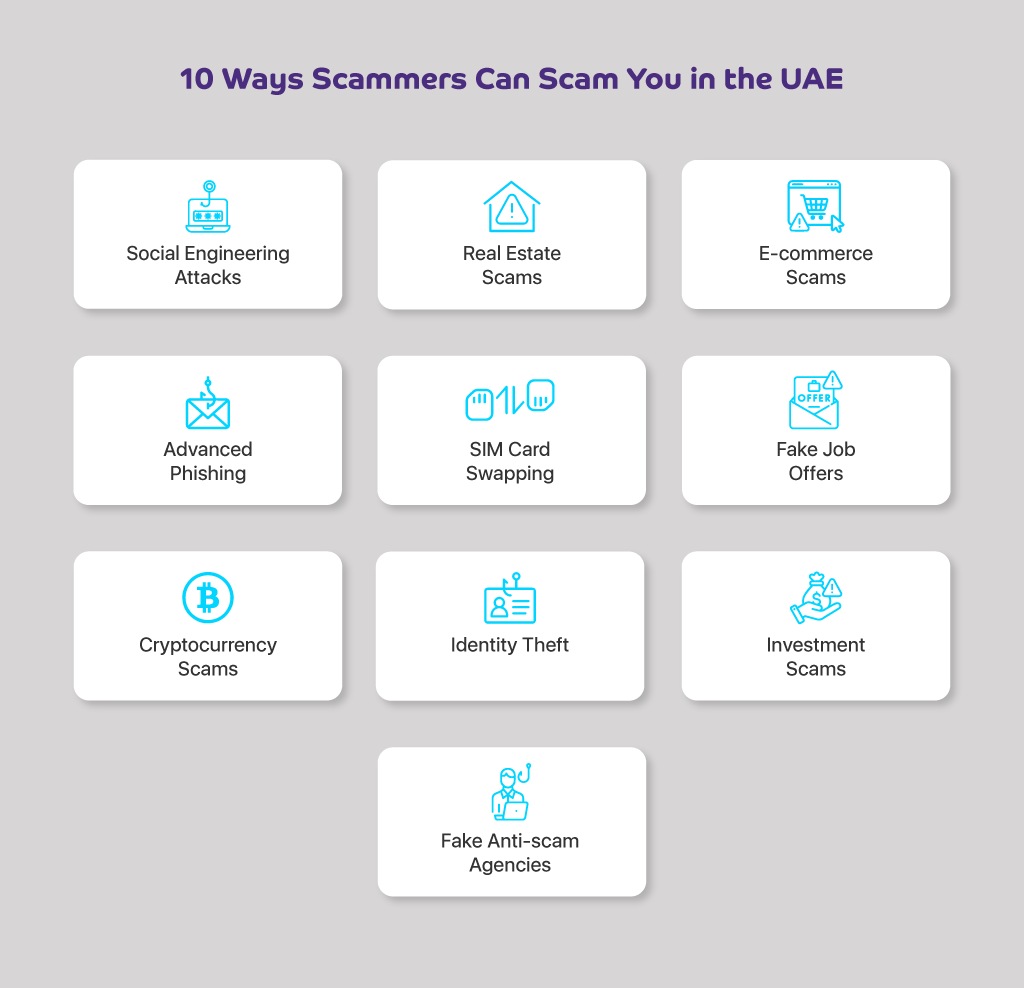Home » Cashless Payments Knowledge Hub » 10 Ways Scammers Can Scam You in the UAE

Cybersecurity analysts report that as many as 3.4 million[1] Phishing attempts were detected in the UAE in just one quarter of a year. The country’s economic prosperity and cultural diversity make it a prime target for various scams, from real estate fraud to identity theft.
This blog aims to dig into these sophisticated scams, shedding light on the methods that are often overlooked but are equally damaging. The focus is not just on raising awareness but on providing actionable insights.
While many know the basic scams, there’s a growing need to understand more advanced and less obvious tactics that scammers employ. According to a survey[2], Dubai Police and DED, about 27% of consumers have fallen victim to phishing scams, and nearly 20% have encountered credit card fraud.

Let’s look at the practical steps individuals can immediately apply to enhance their cybersecurity.
You can get targeted through unsolicited calls or emails that appear to be from government officials or financial institutions. Instead of taking the information at face value, verifying its authenticity independently is crucial. This can be done by contacting the organization’s official website or customer service line.
Scammers create fake property listings to attract potential renters or buyers. These listings often feature properties at rates that seem too good to be true. Before making any financial commitments, it’s advisable to cross-verify the property details using reliable sources. The Dubai Land Department provides an app allowing users to check property listings’ legitimacy.
Online shopping scams often involve counterfeit products or sellers never delivering purchased items. Always check for secure payment gateways and verified sellers. Websites with SSL certificates and trusted payment options are generally more reliable.
One way to protect your financial transactions is using the Letsgopayit card for all your payments. With the Payit mobile wallet app, you only top up the amount you need for your monthly transactions, reducing the risk of being scammed with large sums of money. The mobile PIN also saves you from sending money to any scammer.
Phishing scams have taken a more sinister turn with targeted attacks known as spear phishing. In these cases, the scammer impersonates someone the target knows and trusts. One of the most powerful security measures is multi-factor authentication which can prevent unauthorized access, even if login details are compromised.
In a SIM card swapping scam, the attacker gains control of the victim’s phone number, often linked to various personal accounts. It’s essential to update account recovery options regularly to mitigate this risk. Additionally, using authentication apps instead of SMS-based two-factor authentication provides a more substantial security layer.
Related: Types of Financial Fraud in The UAE
The job market is competitive, and scammers exploit this desperation by posting fake job listings. These listings appear on reputable job boards and may even mimic actual companies.
They’ll offer high salaries, minimal work hours, and other perks that make the job seem like a dream come true. But the catch is often a request for personal information or even money for training or equipment. Always be skeptical of job offers that seem too good to be true. To verify the legitimacy of a job offer, go beyond just emailing back.
Cryptocurrency, with its promise of high returns, has become a fertile ground for scammers. They lure investors with schemes that promise quick profits, often using social media platforms to spread their false narratives. These scams range from pump-and-dump schemes to fake investment platforms that disappear when they collect enough money.
Protecting your investments starts with due diligence. Always use reputable cryptocurrency exchanges that have been vetted and have a history of reliable service. Look for deals that comply with regulatory standards and offer secure transaction methods.
Identity theft is the most common type of scam that leads to various fraudulent activities in your name. Practice regularly monitoring your credit reports for any suspicious activities. Securely dispose of any documents that contain sensitive personal information.
Concerned about the safety of your money? Rest easy. Payit operates with the same level of security as FAB Bank. Your financial safety is a non-issue when using Payit.
Investment scams often lure individuals with the promise of high returns. It is a great practice to conduct thorough research before investing. Consulting a financial advisor will also help you make safer investment choices. Regulatory websites can provide information on registered financial advisors and investment firms.
Some scammers pose as agencies that promise to recover funds lost to scams – for a fee. Never pay any upfront fees for such services. Always consult with law enforcement agencies and verified legal advisors for scam recovery.
Scams are getting trickier by the day. This is especially true in the UAE, where there’s a lot of money and a mix of cultures. Knowing about scams is good, but it’s just the starting point. What counts are the practical things you can do to protect yourself?
Always prioritize verification and due diligence, whether you’re dealing with property listings, job offers, or online transactions. By being proactive and vigilant, you can significantly reduce the risk of falling victim to scams.
Manage your payments smartly with Payit – sending money to your home country or paying bills, Payit digital wallet offers a secure and faster way to make payments. Download the Payit app today and take control of your financial security.